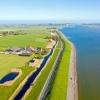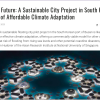Financing Adaptation
Sufficient financial resources and capacity to access available resources are critical for adaptation. Also, various financial mechanisms, incentives and budget systems are needed to implement climate adaptation measures. In addition, the process of comparing different measures, including their costs and benefits, sometimes also consulting with stakeholders for their preferences is important. This can be part of the risk dialogues, when different climate impacts, and needed strategies are discussed. The economic impacts of potential disasters if not prevented also needs to be understood.
Why?
Understanding the financial implications of climate impacts, provides the rationale for making decisions on investments. Financial mechanisms can provide incentives for actors to make adaptive choices. This is for example clear in urban development when space is needed to absorb rainwater and prevent flooding. This requires reserving space for infiltration, via for example nature-based solutions. However, it is not seen as having a direct financial benefit for the developer, it will not be implemented.
The figure illustrates the important need for pooling of resources in climate adaptation. For example, if a coastal dune protects the coastline from flooding, maintaining this coastal protection also benefits tourism and recreation that provide great financial revenues and socio-cultural values. Investing in the beach could therefore pool resources from these mentioned sectors.
Articles
Contribute!
We are looking for your stories and cases, please submit them here.
Financing at national level
Financing at regional level
Financing at local government level
Financing at community level












